|
|
|
Sort Order |
|
|
|
Items / Page
|
|
|
|
|
|
|
| Srl | Item |
| 1 |
ID:
145491
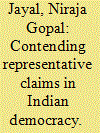

|
|
|
|
|
| Summary/Abstract |
This article essays an interpretation of representative claims articulated in the campaign for the Lok Sabha election of 2014, arguing that this election signals a shift from one dominant type of representative claim to another. The first two claims—the classical liberal view of political representation as an aggregation of preferences and descriptive representation—are embodied by the Congress Party and the social justice parties respectively. These claims are located within the universe of representative democracy, and are sought to be transcended by two new representative claims, encountered in the 2014 election. These are counter-democratic populism and realist Caesarism, signified by the Aam Aadmi Party and the Narendra Modi-led Bharatiya Janata Party, respectively. While these two do not dispense with representative democracy, their claim to provide a more effective or stronger form of democracy indicates a significant departure that redefines the relationship between representation and democracy.
|
|
|
|
|
|
|
|
|
|
|
|
|
|
|
|
| 2 |
ID:
047087
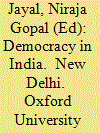

|
|
|
|
|
| Publication |
New Delhi, Oxford University Press, 2001.
|
| Description |
xxii, 571p.
|
| Standard Number |
0195655613
|
|
|
|
|
|
|
|
|
|
|
|
Copies: C:1/I:0,R:0,Q:0
Circulation
| Accession# | Call# | Current Location | Status | Policy | Location |
| 044380 | 321.80954/JAY 044380 | Main | On Shelf | General | |
|
|
|
|
| 3 |
ID:
092205
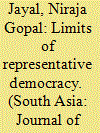

|
|
|
|
|
| Publication |
2009.
|
| Summary/Abstract |
We are conversant today with a variety of democratic deficits. There is the gap between the promise and performance of democracy; then there is also the gap between the success of procedural democracy and the failure of the project of substantive democracy. This paper reflects a different sort of democratic disappointment however. It is an interrogation, not of India's democracy per se, but of a particular strand of democratic discourse and practice in India that has become disconcertingly powerful in the last two decades. This is a line of argument that privileges representation-indeed a particular form of it-as the defining principle of democracy and in so doing, denudes the democratic ideal of all substantive content beyond representation. The microcosmic representation of all sections of the population in all institutions-not only those of public governance, but also others such as the media and the private sector-becomes the pursuit that inspires democracy, and as such every advance in this direction is seen to constitute a further deepening of democracy.
|
|
|
|
|
|
|
|
|
|
|
|
|
|
|
|
| 4 |
ID:
054606
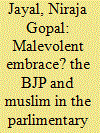

|
|
|
|
|
| Publication |
July 2004.
|
| Summary/Abstract |
The Indian parliamentary election of 2004 was an election of many firsts: it was the first Lok Sabha election of the twenty-first century; it was the first election in which political communication came to be conducted in the corporate vocabulary of image-making, branding and marketing; it was the first election after the first ever non-Congress government completed a full term in office; and it was the first election after which the elected leader of the single largest party declined the prime ministership and nominated another. It was also arguably the first general election in which the minority vote was assiduously courted by a party whose very identity was, since the early 1990s, defined by its hostility to minorities. This essay analyzes the failed attempt of the BJP to reinvent itself as a moderate and inclusivist party in the election campaign of 2004, and the response of the Muslim community to this initiative. It also examines the results of the election in constituencies where the Muslim population exceeds 10 percent, including the nomination of candidates, party strategies, and the final outcomes.
|
|
|
|
|
|
|
|
|
|
|
|
|
|
|
|
| 5 |
ID:
107020
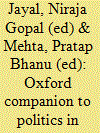

|
|
|
|
|
| Publication |
New Delhi, Oxford University Press, 2010.
|
| Description |
xxvi, 618p.
|
| Standard Number |
9780195669763, hbk
|
|
|
|
|
|
|
|
|
|
|
|
Copies: C:1/I:0,R:1,Q:0
Circulation
| Accession# | Call# | Current Location | Status | Policy | Location |
| 055207 | 320.54/JAY 055207 | Main | On Shelf | Reference books | |
|
|
|
|
| 6 |
ID:
164040
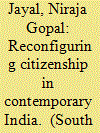

|
|
|
|
|
| Summary/Abstract |
In this paper the author revisits her book, Citizenship and Its Discontents: An Indian History (2013), to examine its central themes—status, rights and identity—in relation to political developments in India since 2014. The paper argues and provides evidence for, firstly, the greater consolidation of a jus sanguinis citizenship regime, with an attenuation of religion-neutral laws of citizenship; secondly, a shift from a rights-based conception of social citizenship to a contributory approach to welfare, now burdened with the requirement of a biometric identity; and, finally, the routinisation and normalisation of identitarian violence against Dalits and Muslims, rendering their citizenship even more precarious.
|
|
|
|
|
|
|
|
|
|
|
|
|
|
|
|
|
|
|
|
|